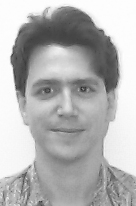
Spring/Summer 1999
Volume 6, Issue 2
Spring/Summer 1998
Volume
3, Issue 1
January 1995
Volume
2, Issue 4
October 1994
Volume
2, Issue 1
January 1994
 |
Parallel Profile - Alan CarleFaculty Fellow, Computational and Applied Mathematics, Rice University |
|
Alan Carle received his B.A. (magna cum laude, 1984), M.S. (1989), and Ph.D. (1992) in computer science (CS) from Rice University. In 1991, he began his career as a research associate for CS, the CRPC, and the Keck Center for Computational Biology. In 1993, Carle was named a research scientist with CS and the CRPC. This year, he became a research faculty member in the Rice Computational and Applied Mathematics Department. Carle's research interests are in the areas of automatic differentiation (AD) and its application to modeling and numerical optimization, compiling for parallel computers, interactive programming environment design and implementation, programming language implementation, translator prototyping techniques, incremental and parallel algorithms, and attribute grammar dialects and evaluation techniques. For nearly a decade, he has been a leader of the AD Project, a collaboration of the CRPC at Rice and the Mathematics and Computer Science Department at Argonne National Laboratory (ANL). The AD Project was launched in 1991, after Chris Bischof of ANL visited members of the Fortran Parallel Programming Project at Rice. Bischof presented an overview of AD and discussed the potential impact of compiler technology on the field. The visit led to the involvement of Carle, who had in-depth knowledge of the advanced Fortran analysis and transformation tools that had been developed at Rice. Building on Carle's experience with the ParaScope system and the experience of the ANL group, the researchers developed a prototype AD tool called ADIFOR for Fortran 77 programs. The ADIFOR system became operational within three months of the start of the collaboration. "From the beginning, we believed that even though AD was not a new area, its impact on practitioners had been minimal because of the lack of robust and efficient tools and educational outreach by the AD community," says Carle. "In recent years, we have expended considerable effort collaborating with engineers and scientists who could profit from this new technology. These collaborations provided credibility for AD and led to invaluable insight into the needs of potential AD users." In 1995, Carle and Bischof released ADIFOR 2.0 , which consists of the ADIFOR 2.0 preprocessor, the ADIntrinsics 1.0 intrinsic handler system, and the SparsLinC 1.0 (Sparse Linear Combination) library. It offers full Fortran 77 support, flexible handling of Fortran intrinsics, and transparent sparsity support. Bischof and Carle were awarded the 1995 Wilkinson Prize for Numerical Software for this achievement. "We are now working on extending the AD ideas to tackle the problem of 'uncertainty analysis,' says Carle. "When computer simulations have input values that are not precisely known, it is necessary to 'quantify' the uncertainties in the module outputs that result from the input uncertainties. Once uncertainty can be quantified, it should be possible to take actions to control the uncertainty of predictions." Carle is a member of numerous professional organizations, including the ACM, ACM SIGPLAN, SIAM, IEEE, AND AIAA. He served as conference/workshop referee of the 1996 SIAM Conference on Computational Differentiation, and as journal referee of Computational Optimization and Applications. He has been a member of the CRPC Technical Steering Committee since 1996. He is the principal investigator (PI) or co-PI for several industry and government grants, including a 1998 Boeing grant for "ADIFOR Application to Grid Tools," and is the author of more than 40 papers and reports. |
|